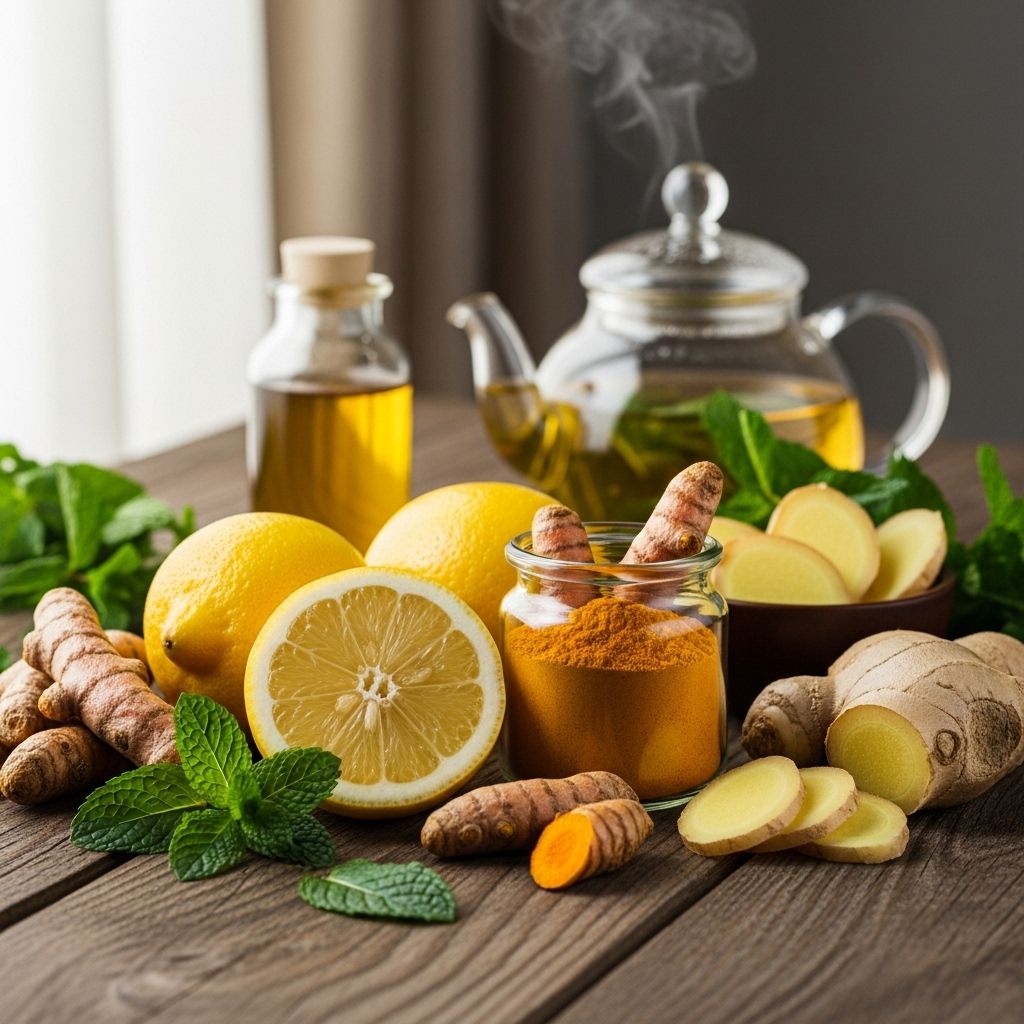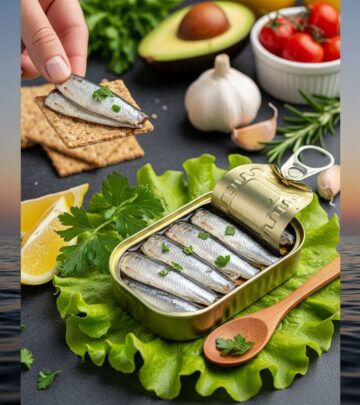16 Effective Home Remedies For Jaundice: Natural Treatments & Prevention
Soothing kitchen-shelf ingredients that aid recovery and restore vitality.

Jaundice is a liver-related condition marked by the yellowing of the skin and eyes. This occurs due to excess buildup of bilirubin, a yellow pigment produced by the breakdown of red blood cells. While medical supervision is essential for proper diagnosis and management, several home remedies and lifestyle practices may help alleviate symptoms, strengthen the liver, and support recovery. This guide explores 16 practical home remedies, key prevention strategies, and dietary tips for managing jaundice naturally.
Understanding Jaundice: Causes and Symptoms
Jaundice is commonly recognized by visible yellow discoloration of the skin, eyes, and mucous membranes. Other symptoms may include:
- Extreme fatigue or weakness
- Poor appetite
- Fever
- Abdominal pain and swelling
- Dark urine and pale stools
Common causes of jaundice include viral hepatitis, liver diseases, excessive alcohol consumption, bile duct obstruction, and reactions to certain medications. In newborns, physiologic jaundice is frequent due to immature liver function.
Best Home Remedies For Jaundice
These natural remedies, rooted in traditional wisdom and supported by preliminary scientific findings, may help manage jaundice symptoms and promote liver health. However, they should complement—not replace—medical treatment.
1. Sunlight Exposure
Key Benefit: Promotes the breakdown of bilirubin in infants and may offer supportive benefits for adults. Sunlight exposure is 6.5 times more effective than standard phototherapy for neonatal jaundice, according to some studies.
- Expose the affected person (especially infants) to indirect sunlight for 10–15 minutes daily, preferably in the early morning.
- Avoid direct midday sun to reduce the risk of sunburn.
Note: Always seek advice from a healthcare provider regarding sunlight exposure for babies.
2. Sugarcane Juice
Key Benefit: Rich in antioxidants and hepatoprotective properties, sugarcane juice helps keep the liver hydrated and may alleviate jaundice symptoms.
- Drink 1–2 glasses of fresh sugarcane juice daily.
- Ensure the juice is hygienically prepared to avoid infections.
3. Barley Water
Key Benefit: Barley acts as a natural diuretic and supports detoxification, helping in flushing out excess bilirubin.
- Boil 1 tablespoon of barley in 2 cups of water until reduced by half.
- Drink this decoction 2–3 times a day.
4. Lemon Juice
Key Benefit: Lemon is packed with vitamin C and antioxidants, aiding in liver detoxification and boosting immunity.
- Mix the juice of ½ lemon in a glass of lukewarm water.
- Consume on an empty stomach every morning.
5. Tomato Juice
Key Benefit: Tomatoes are loaded with lycopene and antioxidants, which can reduce oxidative stress and safeguard liver tissue.
- Blend 2–3 ripe tomatoes, strain the juice, and drink it in the morning.
- Add a pinch of black pepper and salt for flavor.
6. Amla (Indian Gooseberry)
Key Benefit: As a potent source of vitamin C, amla enhances liver function and exerts strong antioxidant effects.
- Eat 2–3 raw amlas daily or drink fresh amla juice.
- Alternatively, add amla powder to warm water or smoothies.
7. Turmeric Milk
Key Benefit: Curcumin in turmeric reduces inflammation and aids liver regeneration.
- Add ½ teaspoon of turmeric powder to a glass of warm milk.
- Stir well and drink at bedtime.
8. Radish Leaves Juice
Key Benefit: Radish leaves stimulate appetite and promote bile flow, which assists in liver detoxification.
- Extract juice from fresh radish leaves (about half a cup).
- Drink this juice twice daily for effective relief.
9. Buttermilk with Black Pepper
Key Benefit: Buttermilk is soothing and helps cool the body, supporting easy digestion while pepper aids in liver function.
- Mix a pinch of black pepper and cumin powder into a glass of buttermilk.
- Drink this 2–3 times a day.
10. Almonds, Dates, and Cardamom Paste
Key Benefit: This blend offers essential nutrients and antioxidants for liver repair.
- Soak 5–6 almonds and 3 dates overnight, peel and blend them with 1–2 cardamoms.
- Add a little water or milk and consume the paste daily.
11. Basil (Tulsi) Leaves
Key Benefit: Basil leaves provide antibacterial and hepatoprotective effects helping fight liver infections.
- Chew 4–5 fresh basil leaves daily or make tea by boiling leaves in water for 5 minutes.
- Strain and drink while warm.
12. Goat Milk
Key Benefit: More easily digested than cow’s milk, goat milk may strengthen immunity and contribute to faster recovery.
- Drink a glass of boiled goat milk once a day.
13. Bitter Gourd (Karela) Juice
Key Benefit: Bitter gourd helps detoxify the liver and supports metabolic function.
- Extract the juice of 1–2 bitter gourds and dilute with water if necessary.
- Drink 1/2 cup of this juice on an empty stomach daily.
14. Herbal Tea (Chamomile, Dandelion, or Green Tea)
Key Benefit: Herbal teas contain liver-friendly antioxidants and anti-inflammatory compounds.
- Steep 1 teaspoon of your chosen herb in hot water for 5–7 minutes.
- Drink 1–2 cups a day.
15. Oregano Tea
Key Benefit: Oregano contains tocopherols and powerful antioxidants that help lower oxidative stress on the liver.
- Boil 1–2 teaspoons of dried oregano leaves in 1 cup of water for 5 minutes.
- Strain and drink immediately; optional: sweeten with honey.
- Take 3 times daily for best results.
16. Papaya Leaf Juice
Key Benefit: Papaya leaves are rich in enzymes such as papain and chymopapain, which aid digestion and liver function.
- Crush fresh papaya leaves to extract juice.
- Mix ½ tablespoon of this juice with 1 tablespoon of honey.
- Consume 2–3 times a day.
Note: These home remedies may offer symptomatic relief and boost natural recovery but should not replace professional medical care. Always consult a healthcare provider, especially in cases of severe or persistent jaundice.
Prevention Tips: Maintaining Liver Health
Alongside remedies, preventive habits play a major role in keeping your liver healthy and reducing jaundice risk.
- Maintain a healthy weight and exercise regularly.
- Avoid excessive alcohol consumption.
- Monitor and manage cholesterol levels.
- Practice good hygiene; wash hands and clean surfaces thoroughly.
- Drink only boiled or purified water and consume fresh, well-cooked foods.
- Vaccinate against hepatitis where appropriate.
Foods To Avoid During Jaundice
Since the liver is already stressed, it is wise to avoid foods that are hard to process or increase the toxin load:
- Sugar: Sweets and processed foods can aggravate symptoms.
- Meat: Protein-rich animal products are harder to digest during liver illness.
- Dairy Products: Milk, cheese, and butter can burden the liver.
- Salt: High sodium intake contributes to fluid retention and may worsen symptoms.
Choose fresh fruits, vegetables, whole grains, and light meals instead. Avoid oily, fried, and spicy foods.
What Causes Jaundice?
The primary trigger for jaundice is an overabundance of bilirubin due to problems with bile production or flow. Common causes include:
- Viral hepatitis (especially hepatitis A, B, and C)
- Alcoholic liver disease
- Obstruction of the bile duct (gallstones, tumors)
- Hemolytic anemia (excess breakdown of red blood cells)
- Adverse drug reactions inhibiting liver function
- Genetic or autoimmune disorders
In newborns, the liver is often immature, leading to the common and usually temporary condition known as neonatal jaundice.
Key Takeaways
- Jaundice is caused by increased bilirubin levels in the blood.
- Yellowing of skin and eyes, weakness, and appetite loss are prime symptoms.
- Hydration, increased fluid intake, sunbathing, and consuming antioxidant-rich foods like papaya leaves, grapes, tomatoes, amla, and lemon support recovery.
- Maintain a healthy weight and hygiene, avoid alcohol, and steer clear of hard-to-digest foods to reduce risk and promote liver healing.
Frequently Asked Questions
Q1: Are home remedies safe for treating jaundice?
A: Most home remedies use natural ingredients and can soothe mild symptoms, but they cannot replace medical care. Always consult a doctor, especially for infants, pregnant women, or chronic cases.
Q2: How long does it take to recover from jaundice with home remedies?
A: Mild jaundice may improve within a few weeks with supportive care. The duration depends on the underlying cause and overall health. Severe or chronic jaundice needs medical intervention.
Q3: Is sunlight exposure truly beneficial for jaundice?
A: Controlled sunlight exposure is a proven and effective therapy for neonatal jaundice and may also benefit adults. However, ensure safe timing and consult healthcare professionals.
Q4: Can diet alone cure jaundice?
A: Dietary changes help recover faster but rarely cure jaundice by themselves. Addressing the root cause with a doctor is crucial.
Q5: Which foods and drinks are best avoided during jaundice?
A: Avoid sugar, red meat, dairy products, salt, oily, fried, and processed foods during jaundice episodes.
SEO Table: Quick Overview of Home Remedies
| Remedy | Main Benefit | How To Use |
|---|---|---|
| Sunlight | Breaks down bilirubin | Expose to early morning sun 10–15 min |
| Sugarcane Juice | Hydration, liver protection | Drink 1–2 glasses daily |
| Lemon Juice | Liver detoxification | ½ lemon in warm water, AM |
| Papaya Leaf Juice | Digestive enzyme support | ½ tbsp juice + honey, 2–3 times daily |
| Oregano Tea | Antioxidant action | Tea, 3 times daily |
The information in this article is intended for educational purposes only. Always seek the advice of a qualified healthcare provider with any questions regarding jaundice or medical conditions.
References
- https://www.stylecraze.com/articles/effective-home-remedies-to-cure-jaundice/
- https://pmc.ncbi.nlm.nih.gov/articles/PMC5559545/
- https://www.aetna.com/cpb/medical/data/300_399/0332.html
- https://pmc.ncbi.nlm.nih.gov/articles/PMC300773/
- https://www.businessinsider.com/guides/health/treatments/how-to-lower-bilirubin
- https://www.stylecraze.com/author/sucharitamishra/
Read full bio of Sneha Tete









